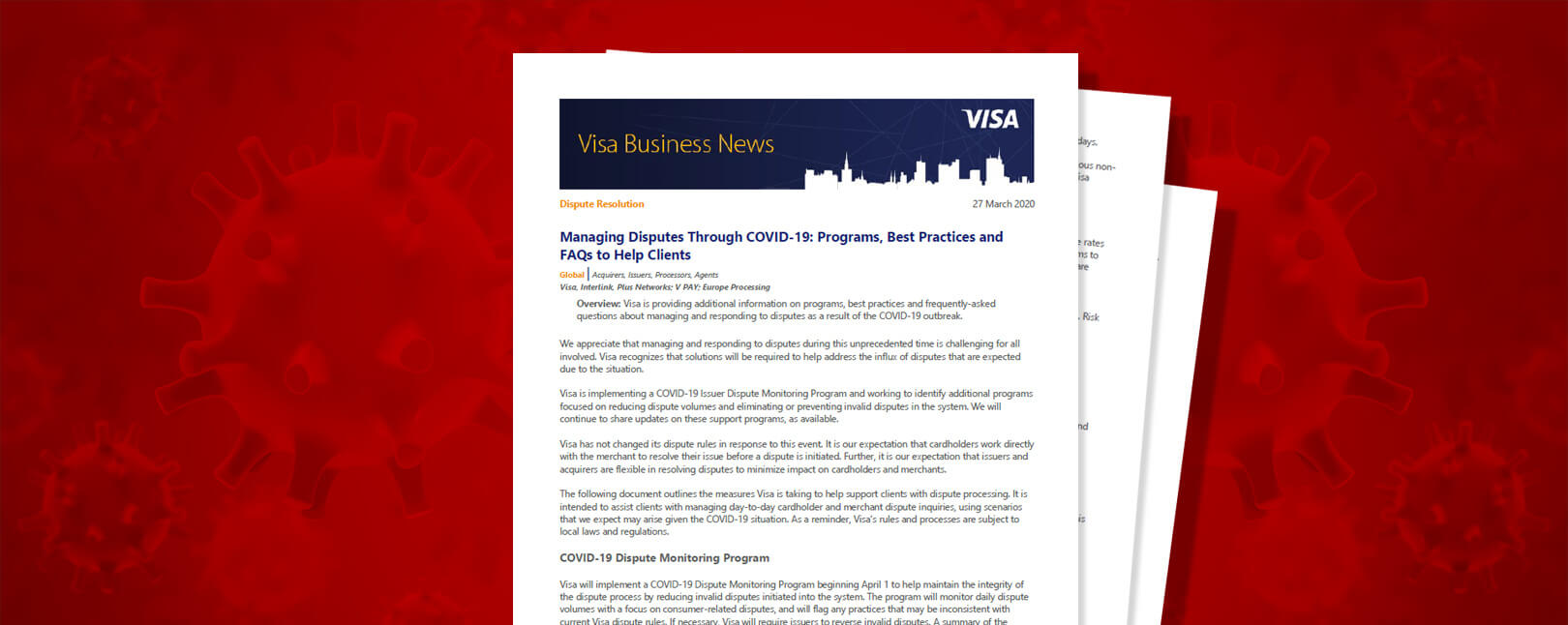Visa Offering Crisis Relief for Businesses in Key Impacted Verticals
This is a stressful time for merchants in every vertical. Despite the potential for increased online traffic, you may also be contending with a variety of new obstacles, including labor shortages, supply chain disruption, delivery delays, and more. All of these threats combined could prove to be substantial drains on your revenue.
There are some challenges that are unique to individual verticals. Travel and entertainment merchants, for instance, have obviously been hard-hit by the global COVID-19 outbreak. Some third-party services are in a position to help; Air Canada Vacations, for instance, recently announced they plan to dispute chargebacks on behalf of their affiliated travel agents. Not everyone can be so lucky, though.
Does that mean you’re on your own? Well, not necessarily.
Card networks like Visa and Mastercard are well-aware of the pain endured by merchants because of the coronavirus pandemic. In response, they’re making adjustments to standard policies and procedures that will help alleviate some of the strain.
Let’s have a look at what changes Visa implemented to lend a hand to struggling businesses.
Visa COVID-19 Dispute Monitoring Program
Visa adopted the new COVID-19 Dispute Monitoring Program effective April 1, 2020. In their words, the program will “help maintain the integrity of the dispute process by reducing invalid disputes initiated into the system,” as they pertain to travel and entertainment merchants.
In short, this new program is aimed at monitoring daily dispute volumes submitted by issuers. The system will flag any practices that may be inconsistent with current Visa dispute rules. If identified as invalid, the issuer would be required to reverse the dispute in question. Plus, under the program, any issuer submitting more than 50 invalid disputes daily in affected verticals will be automatically flagged.
Temporary Relief…but a Long-Term Problem.
Chargebacks911® is here to offer support for merchants struggling with chargebacks. Click below to learn more.

A dispute for goods or services not received will only be considered valid the following criteria are met:
- The submission includes a detailed explanation of the cause of the dispute.
- The merchant is able to provide service, but fails to do so
- The cardholder has already attempted to resolve the dispute with the merchant directly.
Any issuer flagged by the program is required to reverse all invalid disputes within three business days. Failure to abide by this once flagged, or repeated flagging by this program, will be viewed as “egregious noncompliance,” in Visa’s words. Issuers could face dire consequences, including costly non-compliance assessments, and may even lost their right to file Visa consumer disputes for relevant reason codes.
Additional Changes to Excessive Disputes Programs
The Visa COVID-19 Dispute Monitoring Program is a positive and much-needed step toward protecting businesses in the most vulnerable verticals at this time. It’s not the only action being taken by Visa, though.
Visa operates several fraud- and chargeback-mitigating programs, including the Visa Dispute Monitoring Program (VDMP) and Visa Fraud Monitoring Program (VFMP). These programs impose additional fees and other restrictions on merchants who fail to keep fraud and dispute incidents within a reasonable margin.
The aim of VDMP and VFMP is to encourage compliance and protect Visa’s brand. However, the company is aware of the unusual burden placed on merchants at this time. In response, Visa is modifying their programs to relieve the strain on merchants in those most heavily-impacted verticals.
Both VDMP and VFMP will be suspended for merchants in the travel and entertainment-focused MCCs mentioned above. This temporary move will last through July (the end of the current compliance cycle). This move gives merchants more leeway in terms of fraud and chargeback occurrences during the peak period for the virus.
In addition, the Visa Acquirer Monitoring Program (VAMP) is also partially suspended through the end of the July compliance cycle. Like the merchant program suspensions, this applies only to disputes arising from travel and entertainment merchants (as defined by MCC). For all other transactions, the regular guidelines regarding VAMP still apply. This is not to be confused with the Visa Issuer Monitoring Program, or VIMP.

eCommerce, Fraud & Chargebacks in the Age of COVID-19
What short- and long-term risks do you face as a result of this crisis? How can you protect your business and prevent loss? Download our free report today.
Free DownloadChanges Impacting ALL Merchants
The above is all great news for travel and entertainment merchants…but what about in other business verticals?
Well, there is some good news on that front. Visa is encouraging Regional Risk teams to either suspend, or waive entirely, all VDMP or VFMP fees for merchants outside of travel and entrainment verticals as well. However, we have a few caveats on this point.
First, you must be able demonstrate that your business has been directly impacted by the pandemic. You have to be able to demonstrate material need for the suspension of any fees tied to either VFMP or VDMP. Second, it’s important to note that this move is solely at the discretion of Visa Regional Risk teams. While Visa empowered their teams to suspend or waive fees, they’re not currently obliged to do so.
It’s important to note that all of these changes are temporary. While the durations of these changes are entirely at Visa’s discretion, you should plan for things to go back to normal once the worst of the outbreak passes.
Also, be cognizant of the fact that these policy changes will not impact Visa’s Global Brand Protection Program. Any merchants or acquirers found by Visa to be connected to any illegal activity, or other behavior found to be potentially damaging to Visa’s brand, will not be granted any concessions.
If you’re having trouble navigating chargeback regulations and best practices—whether temporary changes or permanent industry policy—our team of experts are here to help. Chargebacks are a complex and confusing matter, and having someone in your corner to offer support can be a lifesaver.
Click below to learn more about our chargeback mitigation solutions for merchants.










